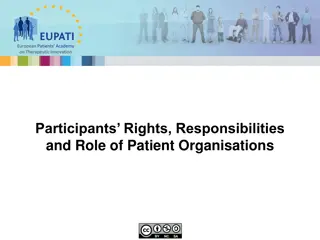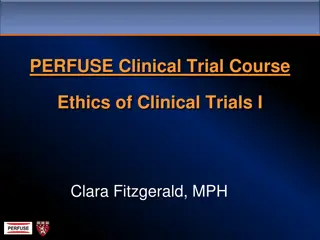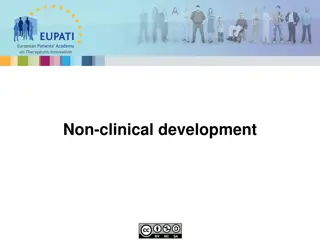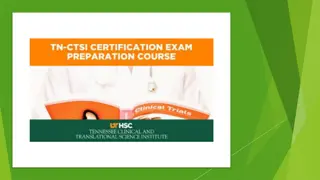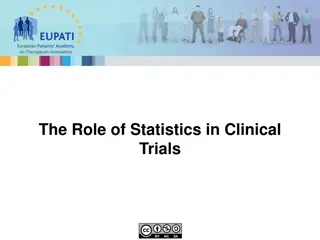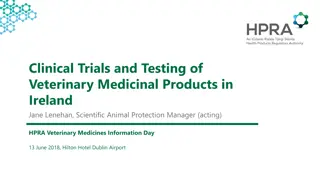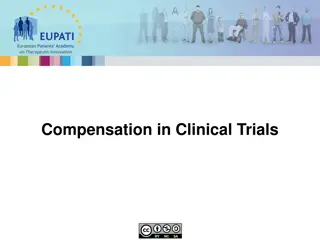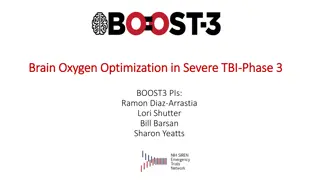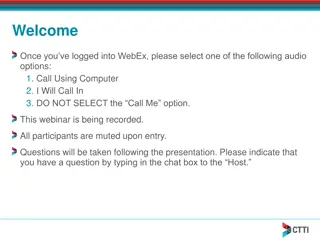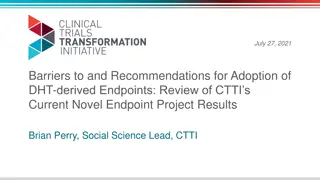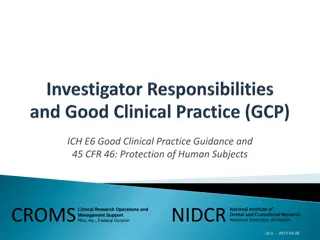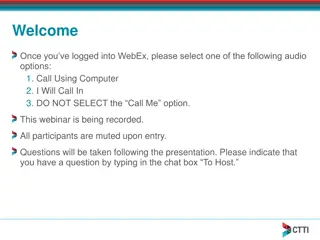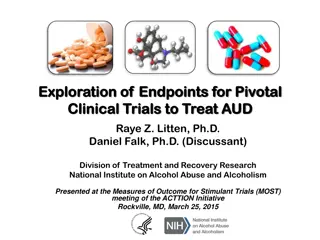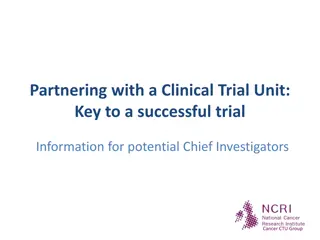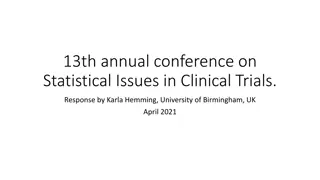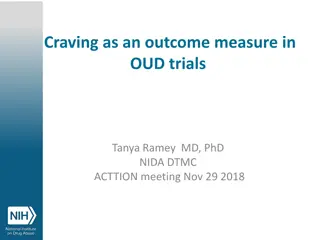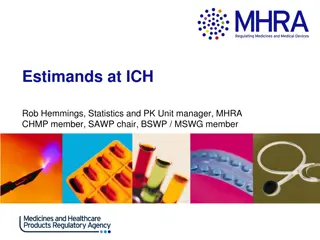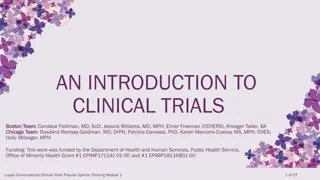Understanding Essential Documents in Clinical Trials
This presentation by Derita Bran, BSN, RN, CCRC, focuses on the documentation required for quality clinical trials, emphasizing Essential Documents outlined in the ICH GCP E6 (R2) guidance. It covers the purpose, definition, and importance of these documents in ensuring subject rights protection, data integrity, and protocol compliance. Compliance with ICH GCP standards is crucial for maintaining ethical and scientific quality in clinical trials.
Download Presentation

Please find below an Image/Link to download the presentation.
The content on the website is provided AS IS for your information and personal use only. It may not be sold, licensed, or shared on other websites without obtaining consent from the author. Download presentation by click this link. If you encounter any issues during the download, it is possible that the publisher has removed the file from their server.
E N D
Presentation Transcript
Presenter: Derita Bran, BSN, RN, CCRC Presentation co-sponsored by TN-CTSI
Objectives Identify documentation necessary to conduct quality clinical trials Understand Essential Documents and their relationship to ICH GCP E6 (R2) guidance and requirements Determine needed documentation & record keeping for your studies
Disclosure No conflicts of interest No financial conflict of interest
Show of Hands Number of Audience conducting NIH trials Number of Audience conducting Industry sponsored trials Other types of studies
ICH GCP E6 (R2) Good Clinical Practice (GCP) is an international ethical and scientific quality standard for designing, conducting, recording and reporting trials that involve the participation of human subjects. Compliance with this standard provides public assurance that the rights, safety and well-being of trial subjects are protected, consistent with the principles that have their origin in the Declaration of Helsinki, and that the clinical trial data are credible. This ICH GCP Guideline Integrated Addendum provides a unified standard for the European Union, Japan, the United States, Canada, and Switzerland to facilitate the mutual acceptance of data from clinical trials by the regulatory authorities in these jurisdictions.
Definition: Essential Documents According to ICH GCP E6 (R2) guidance: Essential documents are documents which individually and collectively permit evaluation of the conduct of a study and the quality of the data produced. These documents serve to demonstrate the compliance of the investigator, sponsor, and monitor with the standards of GCP and with al applicable regulatory requirements
Purpose of Study Documentation Verify that the subject s rights and welfare are protected Ensure integrity of the data Show compliance with the protocol, regulations, guidance, policies, and procedures This presentation will focus on the Essential Documents outline in the ICH GCP E6 (R2) guidance, Sections 4.0 and 8.0
Purpose of Essential Documents and Study Documentation Show compliance to the protocol/FDA regulation/ICH GCP guidance/SOPs, other regulatory requirements Demonstrate the subject s right, safety, and welfare was protected Validate a scientific valid and ethical study Document qualified personnel participated in the conduct of the clinical trial Provide documents for adequate auditing and monitoring Maintenance of current, complete, and accurate data collection
Clinical Investigator Deficiencies Protocol deviations Inadequate record keeping Inadequate/Inaccurate source documentation Inadequate IP accountability Inadequate communication with the IRB Inadequate subject protection
Common Findings Related to Documentation/Essential Documents Eligibility criteria could not be confirmed Discrepancies in records Missing pages or information AE/SAEs not captured/reported Incorrect/incomplete documentation Abnormal labs not assessed Visits not documented Phone calls not documented Re-training not documented ALCOA-C not followed
TheQUALITY of the DOCUMENTATION/ESSENTIAL DOCUMENTS CAN MAKE or BREAKa STUDY
End Results of Poor Documentation Shows lack of understanding of good documentation requirements Lost confidence in site, lack of integrity and credibility Affect the overall quality of data in question, resulting in the exclusion of data Averse affect on subject safety Wasted time of researchers and subjects if data can not be used Could lead to an IRB/NIH/FDA/Sponsor/Institution audit
What to Document? What to Maintain?
Participation Activity We will take 5-10 minutes for groups to read their assigned section of the ICH GCP E6 (R2) guidance Each group will identify the needed essential documents/documentation to show compliance with this section of the ICH GCPs Discussion to follow
ICH GCP E6 (R2): Section 4 4.1.1 Study Team credentials Up-to-Date CV/Resume (every 3 years is industry standard) License/certifications Training logs/documents 4.1.2 Training log/documents 4.1.3 Training log/documents/CITI 4.1.4 Monitoring/Auditing log Reports 4.1.5 Delegation of Responsibilities form (DOR)
ICH GCP E6 (R2): Section 4 4.2.1 Feasibility study Database query EDW query Research Match query 4.2.2 Feasibility CV/# of studies 4.2.3 Study team credentials Site questionnaire
ICH GCP E6 (R2): Section 4 4.2.4 Training log/documents DOR 4.2.5 PI oversight 4.2.6 Credentials/certifications/certificates for any tests/services provided 4.3.1 Training log/documents DOR 4.3.2 Test results signed off by MD within 72 hours (NCS/CS for abnl labs) AE/SAE log/documentation with determination from PI/Investigator Followed to resolution
ICH GCP E6 (R2): Section 4 4.3.3 Documentation approved by IRB 4.3.4 Screening/enrollment log with status/comment section 4.4.1- 4.4.3 Regulatory Binder/electronic/paper files IRB submissions and approval documents Maintain IRB documents outside of iMedRIS IB should be read to include information in the risk section of the ICF 4.5.1-4.5.4 Protocol deviation log CAPA IRB reporting Protocol Signature sheet 1572 if FDA trial
ICH GCP E6 (R2): Section 4 4.6.1 IP Accountability documents 4.6.2 DOR/DOA 4.6.3 IP Accountability documents 4.6.4 Temperature documents/logs Subject instructions/educational material (must be approved by IRB) Documentation of subject s receipt of this material 4.6.5-4.6.6 Subject educational materials Documentation of subject s receipt of this material
ICH GCP E6 (R2): Section 4 4.7 Randomization Procedure Explanation/Reporting of unblinding 4.8.1-4.8.15 IRB approved Informed Consent Form (ICF) IRB approved Subject educational material DOR, listed as being able to obtain consent IRB application as being able to obtain consent Maintain signed and personally dated ICF
ICH GCP E6 (R2): Section 4 4.9.1 ALCOA-C 4.9.2-4.9.3 Case Report Forms (CRFs) 4.9.4-4.9.5 Maintenance of documents- time to keep 4.9.6 Contracts Budgets 4.9.7 Access of study documents for monitoring and auditing
ICH GCP E6 (R2): Section 4 4.10 IRB Continuing Review Progress Reports of the status of the study DSMB reports 4.11 Reporting to the sponsor/IRB AE/SAE reports, follow to resolution of the event 4.12 Follow-up procedures Notification of termination 4.13 IRB close-out form
ICH GCP Section 8.0 Handout Essential Documents in Section 8.0 are grouped into 3 sections: Before the clinical phase of the trial commences During the clinical conduct of the trial After completion or termination of the trial
Documents Before the Trial Commences Trial Master File Investigator brochure/Drug insert/Device manual Signed Protocol Sample Case Report Forms (CRFs) IRB submitted documents and approvals Protocol Informed Consent Form Participant educational materials Advertisement materials IRB Federal Wide Assurance (FWA) IRB Membership
Documents Before the Trial Commencescont. Study Team Credentials License/Certification Training Documents CV/Resume, signed/dated Signed Agreements Contract Disclosure Form Contract Trial Agreement Budget Data Use Agreement
Documents Before the Trial Commencescont. Investigational Product (IP) Sample labels for IP Instructions Dispensing Storage Packaging Disposition Shipping records Laboratory Normal Lab Values/Ranges Technical Procedures Laboratory Director CV/Resume/License Laboratory Certification/Accreditation
Documents Before the Trial Commences cont. Participant List Decoding Procedures for blinded trials Sponsor Visits
Documents During the Conduct of the Trial Updates: Credentials Laboratory documents IRB submissions/approvals Protocol Amendments Investigator brochure/device manual ICF revisions Advertisements Subject information Continuing Review
Documents During the Conduct of the Trial cont. IP Accountability Signed Informed Consent Forms Completed CRFs Documentation of CRF corrections Monitoring Visits and Reports Source Documentation to document compliance Protocol Regulations and Guidance Standard operating Procedures Relevant Communications Letters Meeting Notes Phone calls
Documents During the Conduct of the Trial cont. Signature Sheet Record of retained body fluids/tissue samples Subject logs Screening log Identification code list (master log) Enrollment log Adverse Events Evaluation Resolution Reporting
Documents After Completion the Trial IP Accountability Completed master log Audit Certificate Final close-out monitoring report IRB close-out form
Best Practices GET ORGANIZED Create process for maintenance of the Essential documents (Reg binder, etc.) List of tasks to complete Checklists/Logs Don t procrastinate Keep up to date/keep audit ready Prompt reporting Real time documenting ALCOA-C
Good Documentation Practice What is not documented---Was not done! Document what was done AND what was not done Include reason for any missed information Use black or dark blue ink Do not back or future date and entries Create and maintain documents Assure documentation is ALCOA-C compliant SLIDE rule for errors Be thorough and timely when documenting Perform quality checks Be Proactive when finding errors or omissions
How Can Documentation/Essential Documents be Improved? Creation of site source documents per protocol Adequate training per protocol Delegation of this duty regarding adequate documentation Follow ALCOA-C Monitoring for accurate and complete documentation by study staff Commitment to best documentation practices Oversight/Internal QA process Seek resources to increase knowledge









